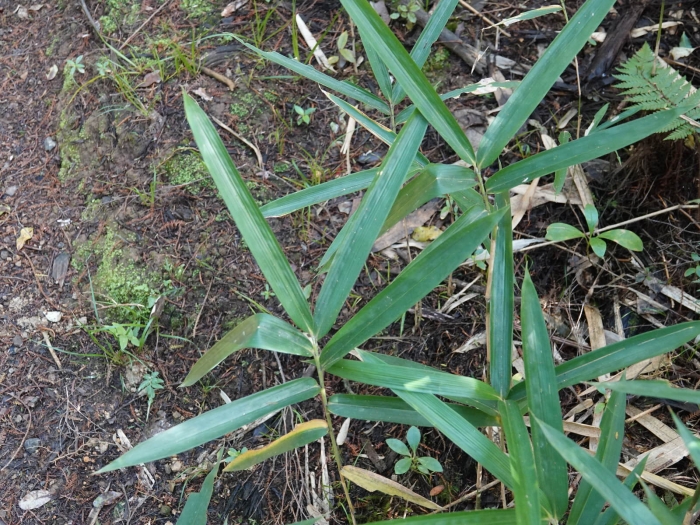Arrow Bamboo
(Pseudosasa japonica)
Arrow Bamboo (Pseudosasa japonica)
/
/

© Jacqui Geux
CC BY 4.0
Image By:
© Jacqui Geux
Recorded By:
Copyright:
CC BY 4.0
Copyright Notice:
Photo by: © Jacqui Geux | License Type: CC BY 4.0 | License URL: http://creativecommons.org/licenses/by/4.0/ | Uploader: jacqui-nz | Publisher: iNaturalist |

























Estimated Native Range
Summary
Pseudosasa japonica, commonly known as arrow bamboo or metake, is a perennial herbaceous bamboo native to the understory of moist forests and the edges of woodlands in Japan and Korea. It is a vigorous grower, forming dense thickets that can reach up to 20 feet in height. The plant features shiny, lance-shaped leaves that can be up to 10 inches long, and its canes are hard and stiff. Arrow bamboo is a versatile plant that adapts well to a range of light conditions, from full sun to shade, and is cold-hardy down to 0°F. It typically has a moderate growth rate.
In cultivation, Pseudosasa japonica is valued for its ability to form a dense screen, making it an excellent choice for privacy hedges or as an understory plant in a woodland garden. It is also suitable for containers, which can help control its spread, and thrives in coastal areas where salty air can be problematic for other plants. The plant’s historical use for making arrows by Japanese Samurai is a testament to the strength and durability of its canes. Arrow bamboo has been recognized for its ornamental qualities with the Royal Horticultural Society’s Award of Garden Merit. It requires well-drained soil and regular watering, especially during dry periods. While generally low-maintenance, it can become invasive if not managed properly, so gardeners should consider containment strategies such as root barriers.CC BY-SA 4.0
In cultivation, Pseudosasa japonica is valued for its ability to form a dense screen, making it an excellent choice for privacy hedges or as an understory plant in a woodland garden. It is also suitable for containers, which can help control its spread, and thrives in coastal areas where salty air can be problematic for other plants. The plant’s historical use for making arrows by Japanese Samurai is a testament to the strength and durability of its canes. Arrow bamboo has been recognized for its ornamental qualities with the Royal Horticultural Society’s Award of Garden Merit. It requires well-drained soil and regular watering, especially during dry periods. While generally low-maintenance, it can become invasive if not managed properly, so gardeners should consider containment strategies such as root barriers.CC BY-SA 4.0
Plant Description
- Plant Type: Grass
- Height: 12-20 feet
- Width: 12-25 feet
- Growth Rate: Moderate
- Flower Color: N/A
- Flowering Season: Spring, Summer
- Leaf Retention: Evergreen
Growth Requirements
- Sun: Full Sun, Part Shade
- Water: Medium
- Drainage: Medium
Common Uses
Border Plant, Hedges, Low Maintenance, Street Planting
Natural Habitat
Native to the understory of moist forests and the edges of woodlands in Japan and Korea
Other Names
Common Names: Yanagi-dake , Idae , Me-Take , Yadake , Japanese Arrow Bamboo
Scientific Names: Pseudosasa japonica , Arundinaria japonica , Arundinaria japonica , Arundinaria matake , Arundinaria matake , Arundinaria metake , Arundinaria usawae , Arundinaria usawai , Bambusa japonica , Bambusa metake
GBIF Accepted Name: